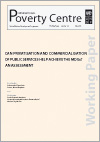
Can Privatisation and Commercialisation of Public Services Help Achieve The MDGs? An Assessment
Abstract:Basic services are essential to reducing poverty and improving quality of life. This working paper focuses on health, education, energy and water. These services contribute to achieving the Millennium Development Goals, as well as being goals in themselves. Over the past twenty years or so, the way in which these services are provided has been subject to considerable policy debate. There has been widespread questioning of the ability of the public sector to effectively deliver such services. Largely as a result, market-oriented solutions have been promoted as a means to overcome apparent constraints posed by state-provided services. Notwithstanding the weaknesses of state provision in many countries and localities, this working paper argues that reliance on private sector provision will fail to address the central challenges of public sector delivery. Furthermore, the process of privatisation creates an incentive framework that undermines, rather than strengthens, the accountability and capacity of the State to provide accessible and affordable services. In addition, the paper argues that the adoption of full cost recovery policies can seriously threaten achievement of the MDGs. This position does not constitute a blanket statement against private sector participation in public services or against user fees. Rather, it maintains that market-led policies fail to contribute to the MDGs and often reduce the likelihood of achieving them. Strengthening the State in assuming central responsibility for providing essential public services will help correct these setbacks.